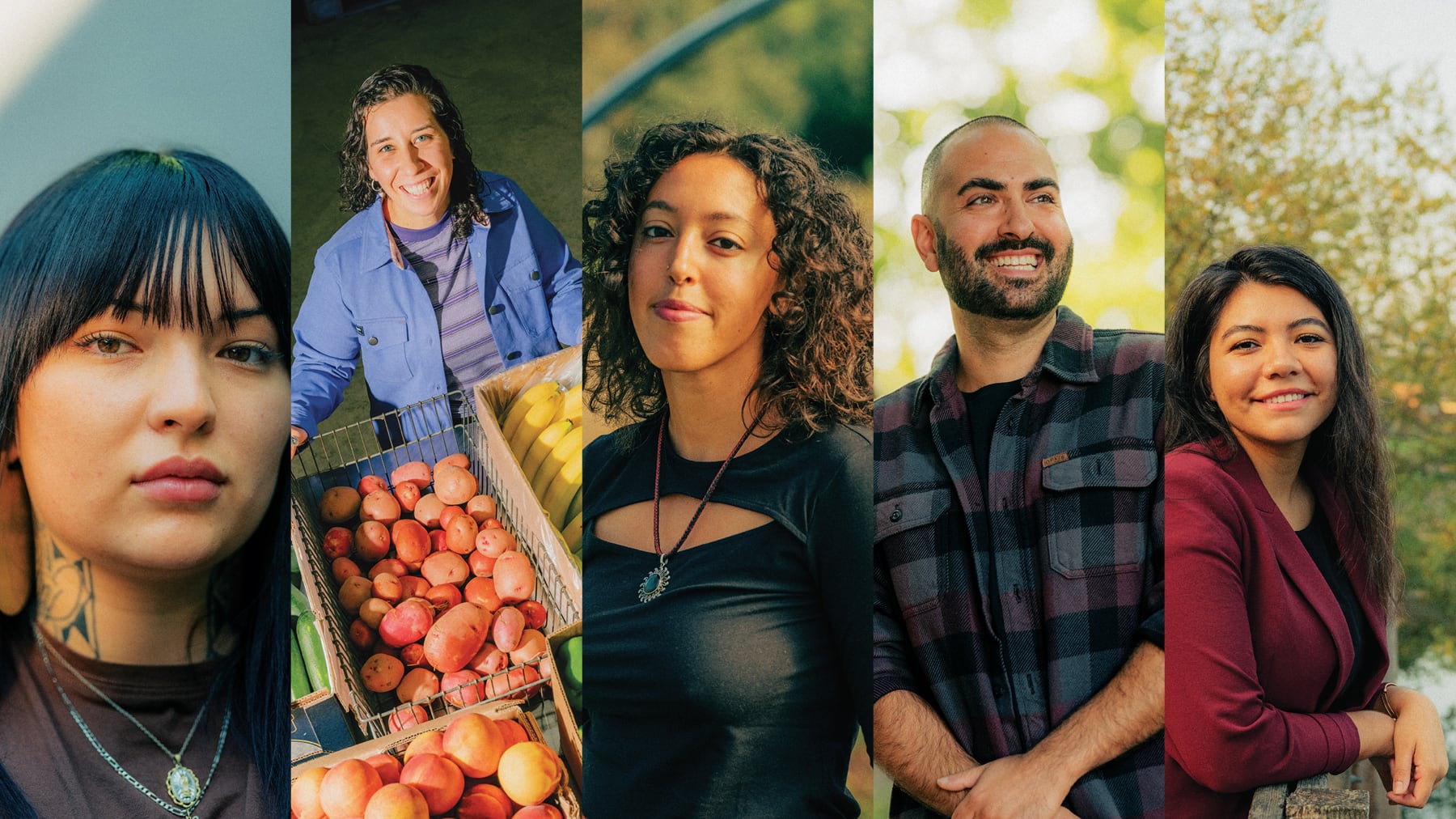Every year Willamette Week awards the Skidmore Prize to four young Portlanders who work every day to make Portland a better place and to preserve the community-oriented nature of the city we all know and love. This year we were so impressed that there’s five winners! If you’ve ever wondered who’s really making a difference in our community, read on.
This year’s finalists included: Joy Alise Davis (Imagine Black Futures), Gustavo Martinez (Bienstar), Charelle Stanley (Wild Diversity), and Elona Wilson (Next Up).
Winners of the Skidmore Prize must be under the age of 36 and work full time for a local nonprofit. Winners received their awards, including prizes of $4,000, at the beginning of the Give!Guide campaign.
Babak Zolfaghari-Azar, 34
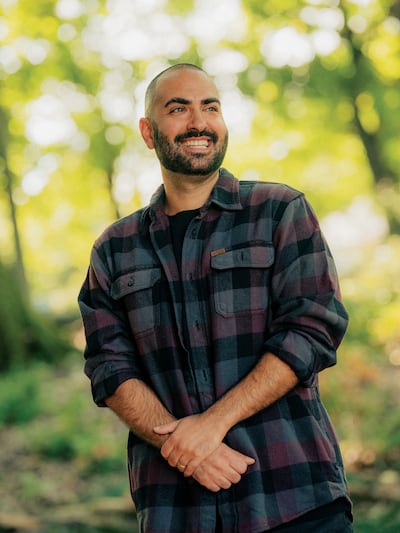
Babak Zolfaghari-Azar’s criminal justice reform career began in the back of a Beaverton Police car when he was 17 years old. After being illegally pulled over and then booked into an adult jail for furnishing alcohol to minors (a charge that was thrown out in court), Zolfaghari-Azar—a straight-A student who had just graduated from Beaverton High School and was headed to Portland State University—spent 12 hours in an orange jumpsuit that would change the rest of his life.
Zolfaghari-Azar, now 34, was shivering cold, hungry and asking for assistance for a man in the booking area who was vomiting while police dismissed his concern and joked around.
“It’s this dehumanizing element that I keep coming back to,” Zolfaghari-Azar says. “It’s one of the only things in my work that I lose sleep over.”
And it’s challenging work. As the senior policy manager at Partnership for Safety and Justice, Zolfaghari-Azar must be able to walk confidently in a wide variety of spaces: courthouses, lawyers’ offices, families’ living rooms, and policy meetings with legislators and lobbyists, to name a few. It’s also one of his special gifts, say his PSJ co-workers.
“Everyone is moved by his warm yet strong and committed presence,” says Shannon Wight, PSJ’s deputy director. “I learn from him regularly just by observing how he does his job and the impact he is able to have.”
A first-generation Iranian American, Zolfaghari-Azar and his family had no experience with the U.S. criminal justice system. He learned more in graduate school at PSU studying criminology and from yet another time he was illegally pulled over, this time in Tigard. (He mostly stays away from the westside suburbs, politely saying, “I don’t vibe well with Beaverton.”)
In 2019, PSJ helped pass Senate Bill 1008, which softened Oregon’s mandatory minimum sentencing law Measure 11 by making sure juvenile offenders aren’t automatically charged as adults and giving them a “second look” halfway through their sentences. Zolfaghari-Azar helps ensure that 1008 and other recent laws are implemented successfully. “That work is in fact harder,” Wight says, than passing the law in the first place.
Zolfaghari-Azar is grateful that PSJ encourages him to continue the direct-service work that he has done throughout his career. He serves as an advocate and support for about a half-dozen young men who are facing charges or are incarcerated, and their families.
“I don’t think of it as a job or a career,” he says. “It’s a moral responsibility; it’s why I’m here.”
In his free time, Zolfaghari-Azar hikes, cares for his dogs Daisy and Rumi, and coaches boys’ junior varsity basketball—first at Grant High School and now at West Linn. Working with teenagers on ball-handling skills or keeping good grades balances out his PSJ job.
“Coaching is so easy compared to talking to families where the kid is facing an attempted murder charge and 10 years in prison.”
Cecilia Estraviz, 32
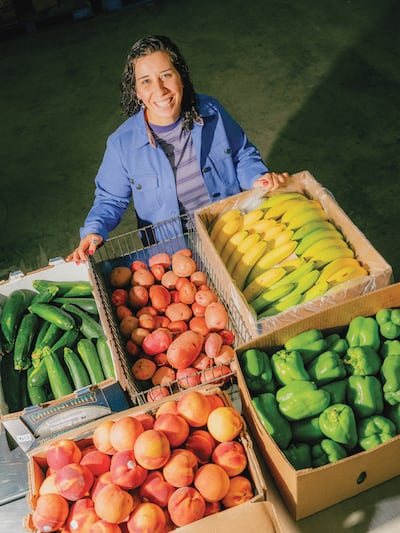
Cecilia Estraviz’s actual job title at the food agency Lift Urban Portland is operations manager, but she has come up with some more clever ones.
As the manager of Lift UP’s food warehouse in Northwest Portland’s industrial area, Estraviz is a “food Tetris expert,” because she accepts lots of food, stores it safely, and then gets it out to her clients. A Lift UP volunteer deemed her an “Incremental Improver” because each time the volunteer arrived at the warehouse, Estraviz had changed something small to improve the experience for everyone.
Finally, all the physical moving of canned foods stacked on pallets makes her quip that her job is “CrossFit with helping people.”
Those pallets are loaded noticeably lower than they were a few months ago due to the end of the government’s COVID-19 relief funds and the rise in inflation. Add in skyrocketing fuel prices, stolen vans, supply chain issues, heat waves, ice storms and wildfires, and it is an exceptionally challenging time to be fighting hunger, says Lift UP executive director Stephanie Barr. (And a hopeful one, given that President Biden has vowed to end U.S. hunger by 2030.)
Still, “Ceci doesn’t accept that hunger is an inevitable, unsolvable problem,” Barr says. “She sees the systemic issues that create hunger but she keeps her focus on ensuring our neighbors have the food they need to stay healthy and secure.”
Estraviz oversees the on-site food programs at 50 low-income buildings in downtown and Northwest Portland, serving over 3,000 food-insecure people each year. Twenty-seven of the buildings have on-site food pantries where Lift UP saw a 57% increase in food distribution in the past year.
And it’s not just cans of chili and boxes of macaroni: One September morning, Lift UP was distributing broccoli, eggs, bread and a late-summer bounty of peaches and zucchini.
That said, Estraviz doesn’t judge clients for the food choices they make.
“When was the last time you were at the grocery store and you went up to someone’s grocery cart who had macaroni and said, ‘Hey, that’s not the healthiest thing to eat’?” she says. “You didn’t because no one does that. It’s really disrespectful.”
Estraviz, 32, grew up in a single-parent home in Southwest Portland. As a financial aid student at Jesuit High School with a Spanish-speaking mother, there was “a lot of otherness” in her childhood. One of the ways she felt different was that her kitchen had plenty of staples such as beans and tortillas, but her pantry wasn’t overflowing with the abundance she saw at friends’ houses.
“It wasn’t until I got older and started reflecting on it where I realized, ‘Oh, I was in a food-insecure household,’” she says. “I don’t think we had the language for it.”
One in five Oregonians experience food insecurity right now, according to the Oregon Food Bank. It’s time for people to update their assumptions about who visits food banks. Estraviz just helped Oregon Health & Science University set up its own student food pantry, for example.
“It’s families, people with student loans, people whose homes have burned down—it’s things that can happen to every single one of us,” she says.
Itzel Chávez Gómez, 28
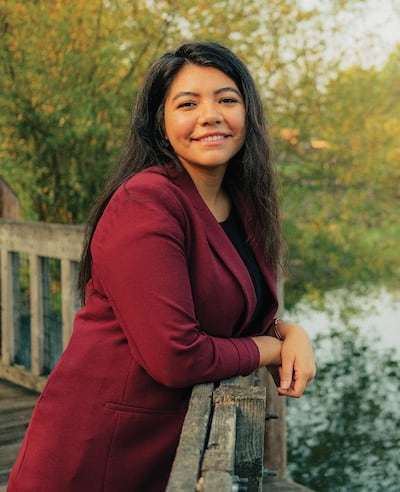
As the first person in her family to graduate with a four-year college degree, Itzel Chávez Gómez knows firsthand the challenges college freshmen face. Choosing a major, for example. When Chávez Gómez, now 28, was deciding what to study at the University of Oregon, she relied on one source: the CBS show CSI: Miami.
Inspired by the character Eric Delko, Chávez Gómez was poised for a career as an undercover agent—double-majoring in political science and Russian because the fictitious Delko’s father was Russian.
“It’s hard to understand what college really is, especially when you don’t have family who has done it before,” Chávez Gómez says.
Chávez Gómez is now the college and career coordinator at the Forest Grove-based nonprofit Adelante Mujeres (“Women Rise Up”). She mentors more than 30 Latina seniors at seven high schools in Washington County, helping them choose a college, fill out applications, and apply for financial aid. She shares her CSI: Miami story with students all the time: “I feel like a mom, telling them, ‘Don’t make the mistakes that I made.’”
In Eugene, she took ethnic studies classes that “opened up my whole world.” She learned about Latino history and, for the first time, started to embrace her own Mexican heritage. (She also learned about the racism embedded in the U.S. criminal justice system, which soured her on the idea of working for law enforcement.)
Her work at Adelante Mujeres continues this celebration of her culture. “I don’t want other Latina students to spend 21 years of their lives being ashamed of who they are,” she says.
Growing up in Beaverton as one of four children of a then-undocumented single mother, the only Latina friends she had were her cousins. She dreaded roll call on the first day of school, worried the teacher would botch the pronunciation of her name. The internalized oppression ran so deep that Chávez Gómez “just wanted to be white.”
Chávez Gómez pioneered Adelante Mujeres’ “Chicas in College” program, which supports 70 Latinas across nine colleges in Oregon, connecting them with campus resources and each other. She also developed the first-ever Chicas Emergency Grant that covers college-related expenses such as tuition, books, housing, meals and transportation.
Adelante Mujeres’ youth development advocate and project developer, Carmen Walsh, says Chávez Gómez works extra hard to make sure students “know someone has their back”: She has thrown summer barbecues and stayed up until 4 am writing recommendation letters for students who have asked at the last minute.
“Itzel gives students the permission to picture what their future could look like and to dream big,” Walsh says. “What a gift.”
Kat Salas, 27
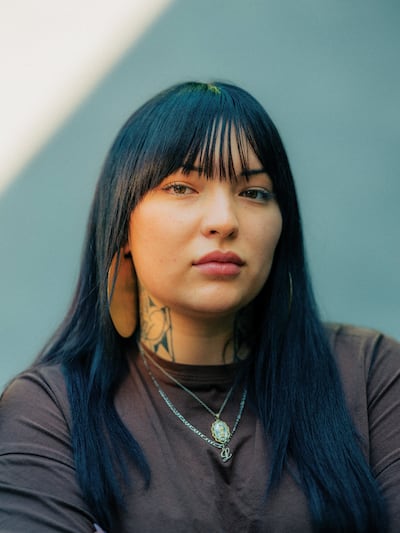
Kat Salas never thought she’d have a social worker-type job. She also never thought she’d live to age 27, either, but here she is at the Nite Hawk Cafe & Lounge on North Interstate Avenue on a Friday afternoon when the fancy coffee shop across the street is unexpectedly closed. “This is more my vibe anyway,” she says.
Salas is program manager for New Day, an arm of the nonprofit New Avenues for Youth. Since its founding in 2018, New Day has served about 450 youth ages 12 to 25 who are being sex trafficked or are at risk for sexual exploitation.
New Day helps youth leave their traffickers and end substance use, but also assists with other life and safety goals. This could include getting a driver’s license, housing, vocational training, mental health services, clean needles, fentanyl test strips, or groceries.
“We’re trying to work ourselves out of the job,” Salas says. “We’re trying to get folks to a place of independence and stability where they don’t need us anymore.”
Just a few years ago, Salas herself would have been eligible for New Day even though, on paper anyway, she had never had a job in her life. Instead, Salas transitioned out of the sex trades at age 23 by getting her tattoo license. Just as she was building momentum in her new career, though, the pandemic shut down all tattoo shops. She applied for an outreach job at New Day even though she had never had a job on paper in her life.
“Kat’s lived experience and equity lens to envision and enact change sets her apart from anyone else I’ve met in my 12 years of this work,” says Sarah Nedeau, director of community-based programs at New Avenues for Youth.
Salas envisioned a transitional housing model for clients in the New Day program Butterfly House—the first of its kind in Oregon. Four people at a time can stay for up to 16 months at Butterfly House; rent, utilities and food are provided. Case managers help with conflict resolution and long-term housing plans. It’s all about building more options for the residents. “You can say no if your rent is covered in a way you cannot say no if your rent’s not covered,” Salas says.
She considers her work at New Day a “radical eulogy” to the people she met in the sex trades who did not make it out. She is alive, she says, because of the women who took care of her when she was a young adult—giving her advice, affirmations, lash glue and baby wipes in strip club dressing rooms.
“Now, I get to work with people who understand some of my pain and struggle, but we also get to work together to problem-solve these really broken parts of the system,” she says. “I can’t imagine a job that someone could offer me that I would like more than my job.”
Qiddist Ashé, 28
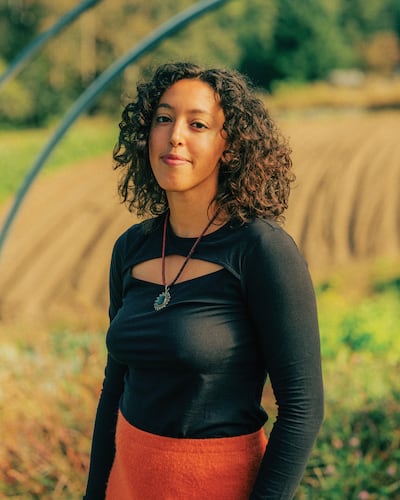
On a fall morning on a farm in the Columbia River Gorge, Qiddist Ashé has already fed the goats, harvested herbs for medicine-making, and tended to the farm cat Sheba, who just gave birth to a litter of five kittens. Ashé is weeks away from purchasing a nearby 10-acre farm as the co-founder and executive director of the Black Oregon Land Trust.
But Ashé, 28, isn’t ready to call herself a farmer. It’s a matter of humility.
“I want to give a lot of reverence to the people pulling 10-hour days with their hands in the soil,” she says. “I’m a ‘budding land steward’ and learning so much from my friends and colleagues.”
That same morning, she had a handful of non-agrarian tasks as well, including working on a grant application for BOLT, a photo shoot, and meeting with other Black land stewards in the area. BOLT, which she started two years ago, creates opportunities for Black farmers in Oregon to connect with each other, access land, and build generational health and wealth.
In the most recent U.S. Department of Agricultural census, only 64 of Oregon’s 67,000 farm producers were Black. Although this strikes Ashé as an undercount, her visibility work has been effective: “I just talked to a farmer out in Eastern Oregon who told me, ‘I had no idea there were other Black farmers here.’”
The lack of diversity on Oregon farms traces back to the state’s founding: An 1857 law excluded African Americans from settling in the territory.
Ashé lives in a 140-square-foot tiny home perched on the 19-acre Mudbone Grown farm in Corbett, which is growing crops such as greens, beans, flowers and squash this fall. Youth organizations and volunteer groups visit weekly—a benefit of being so close to the eastern outskirts of Portland.
“Qiddist approaches her work with a spirit of abundance, and this has been an inspiration for me,” says Mudbone co-owner Shantae Johnson. “She works with an open hand and heart.”
Growing up in Southwest Portland, Ashé hosted an environmental club in her parents’ backyard in elementary school. At 15, she journaled about wanting to raise her future children communally and grow her own food.
Before she started BOLT, Ashé was an elementary school teacher and then a midwife, attending hundreds of births (just the one feline birth so far). She sees BOLT as a continuation of that work: making sure mothers and children are well-fed, educated and have opportunities to build wealth. “All of these threads came together with land at the core.”
She also draws from her birth work when she conceptualizes the growth of BOLT itself. She tries to resist the pressure to always be “scaling up” while fundraising and pitching to donors, and instead move at the “pace of the relationship.”
“We’ve done a lot in two years, but we’re still young,” she says. “We have to think about what is sustainable for each other and for the earth.”
